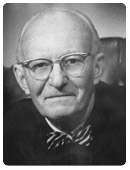
Harold Vernon Froehlich is a retired American politician and judge. He represented Wisconsin's 8th congressional district in the United States House of Representatives for one term in 1973–1974 as a Republican and broke with his party to vote for the impeachment of President Richard M. Nixon.

John James Jenkins was an English American immigrant, lawyer, judge, and Republican politician. He served seven terms as a member of the United States House of Representatives, representing northwest Wisconsin, and served one year as United States district judge for the District of Puerto Rico.
Frederick P. Kessler is a retired American lawyer, arbitrator, judge, and Democratic Party politician. He served as a member of the Wisconsin State Assembly for 24 years between 1961 and 2019, and served 11 years as a state judge in the 1970s and 1980s.
Russell A. Olson was an American farmer and Republican politician. He was the 39th Lieutenant Governor of Wisconsin (1979–1983) and was afterward appointed Midwest Director for the United States Department of Transportation in the administration of U.S. President Ronald Reagan. Before being elected Lieutenant Governor, he represented Kenosha County in the Wisconsin State Assembly for 15 years.
Roland Bernard Day was an American lawyer, politician, and jurist. He was the 24th Chief Justice of the Wisconsin Supreme Court, in 1995 and 1996, after a 22-year career on the court.

Connor Theodore Hansen was a justice of the Wisconsin Supreme Court for 13 years, from 1967 until 1980. An American attorney and Republican politician, he previously served as County Judge and District Attorney of Eau Claire County, and worked as a special agent of the Federal Bureau of Investigation during World War II.
Louis John Ceci is a retired American lawyer, jurist, and Republican politician. He was a justice of the Wisconsin Supreme Court from 1982 through 1993, after serving eight years as a Wisconsin circuit court judge in Milwaukee County. He previously represented northern Milwaukee County in the Wisconsin State Assembly during the 1965 session.
Charles Joseph "Chuck" Chvala is an American real estate dealer, lawyer, and former politician. He served 20 years in the Wisconsin State Senate, representing Dane County, and was the Democratic leader from 1995 through 2002. His political career was ended by a 2002 scandal which found he and other lawmakers had illegally utilized state employees for campaign work.
James Earl Leverich was an American dairy farmer, strawberry grower, and Progressive Republican politician. He served 28 years in the Wisconsin State Senate, and was chairman of the town of Angelo, Wisconsin, for 40 years (1931–1971). He went by his middle name Earl throughout his public career.
Gregory A. Peterson is an American lawyer and retired judge. He served 13 years as a judge of the Wisconsin Court of Appeals in the Wausau-based District III court. Before that, he was a Wisconsin Circuit Court Judge in Eau Claire County for 16 years, including three years as Chief Judge of the 10th Judicial Administrative District of Wisconsin Circuit Courts. Since his retirement, he continues to serve as a reserve judge and arbitrator in the state court system.
Michael T. Sullivan was an American lawyer and judge. He was a judge of the Wisconsin Court of Appeals for 12 years, after serving nearly 30 years as a trial court judge in Milwaukee County.
Michael Joseph Barron was an American lawyer, judge, and Democratic politician from Milwaukee, Wisconsin. He served four years as chief judge of the 1st district of Wisconsin circuit courts, and served a total of 26 years as a circuit judge in Milwaukee County. Earlier in life, he also served two terms in the Wisconsin State Assembly, representing part of northeast Milwaukee, and was a member of the Milwaukee County Board of Supervisors from 1964 until 1973.
Louise M. Tesmer is an American lawyer, judge, and former politician. She was a Wisconsin circuit court judge for 12 years in the Milwaukee County circuit (1989–2001), and has continued to serve as a reserve judge since her retirement. Prior to her judicial service, she served sixteen years in the Wisconsin State Assembly, representing the city of Milwaukee as a Democrat.
Earl William Schmidt is an American lawyer, farmer, politician, and judge. He served nearly 20 years (1982–2002) as a Wisconsin Circuit Court Judge in the Shawano–Menominee circuit, and was Chief Judge of the 9th District of Wisconsin Circuit Courts from 1992 through 1998. Earlier in his career, he was a member of the Wisconsin State Assembly, serving four terms as a Republican.

Dana C. Coolidge was a politician from Wisconsin.
Steven C. Brist is an American attorney and former Democratic politician. He served three terms in the Wisconsin State Assembly and currently works as an assistant city attorney for Madison, Wisconsin.

The 68th Assembly District of Wisconsin is one of 99 districts in the Wisconsin State Assembly. Located in Northwestern Wisconsin, the district comprises the eastern half of Eau Claire County and about half of Clark County, as well as part of southeast Chippewa County. The district includes the cities of Altoona, Augusta, Greenwood, Osseo, Owen, Stanley, and Thorp. The district is represented by Republican Karen Hurd, since January 2023.
Mark D. Lewis is a retired American businessman and Democratic politician. He served six years in the Wisconsin State Assembly (1983–1989), representing Eau Claire County and was later President of the Eau Claire City Council (1993–1997).
David R. Hopkins was an American engineer, businessman, and Republican politician. He served two years in the Wisconsin State Assembly, representing Chippewa County.
Bruce Edward Schroeder is an American lawyer and Wisconsin circuit court judge for Kenosha County. He is the longest-serving state court judge in Wisconsin, having been first appointed in 1983. He was previously district attorney of Kenosha County. He came to national attention in 2021 due to his role as the presiding judge for the trial of Kyle Rittenhouse.




